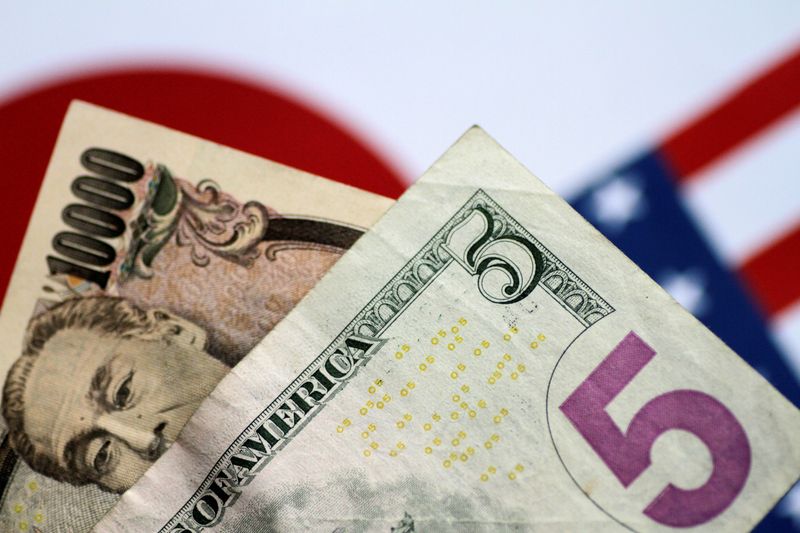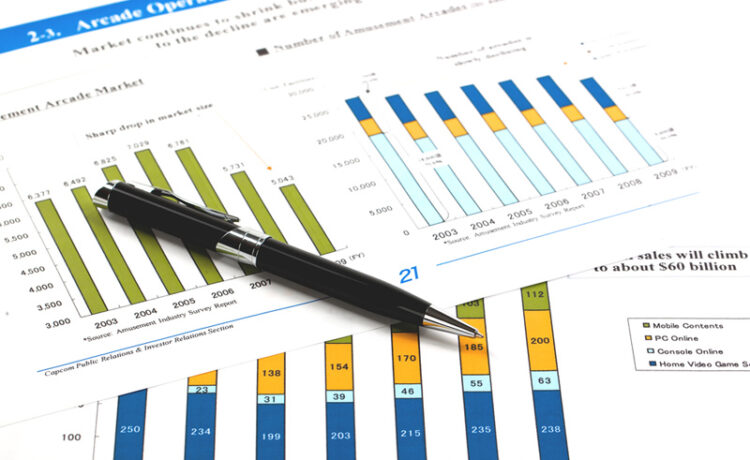
© Reuters. FILE PHOTO: U.S. Dollar and Japan Yen notes are seen in this picture illustration June 2, 2017. REUTERS/Thomas White/Illustration/File Photo
By Gertrude Chavez-Dreyfuss and Harry Robertson
NEW YORK/LONDON (Reuters) -The U.S. dollar dropped on Wednesday, after rising in eight of the last 10 sessions, as investors consolidated gains spurred by a broad reversal of the greenback’s decline in December.
The U.S. currency, however, cut its losses after data showed that business activity in the world’s largest economy picked up in January and a measure of inflation eased. A gauge of prices charged by companies for their products fell to the lowest level in more than 3-1/2 years, data showed.
Investors are now looking to Thursday’s first reading of the U.S. gross domestic product for the fourth quarter, and another inflation reading — the personal consumption expenditure (PCE) data — on Friday.
The fell 0.4% to 103.1 after climbing to a six-week peak on Tuesday. Since the beginning of the year, the dollar has been up around 1.7% this year as stronger-than-expected data and a pushback from central bankers has caused the market to rein in its expectations for rapid Federal Reserve interest rate cuts this year.
Analysts said the U.S. currency is still in the middle of a correction higher, until the Fed starts cutting rates.
The dollar fell 1.2% in December and 1.5% in November, as Fed officials made dovish comments that suggested the central bank was nearing the end of its tightening cycle.
“The correction in the dollar from the decline in Q4 2023 may not be over yet, although momentum indicators are getting stretched,” said Marc Chandler, chief market strategist, at Bannockburn Forex in New York.
“But I am not sure that we have broken out yet. I think we really have to get through not only tomorrow with the U.S. GDP number and the ECB (European Central Bank), but also next Friday’s jobs data. And it still looks pretty good.”
Chandler added that the generally stable economic picture should be enough to reduce the odds of a March rate cut.
On Wednesday, however, U.S. rate futures market priced in a more than 50% chance of easing at the March meeting, up from late Tuesday’s 47% probability, but down from as much 80% factored in about two weeks ago, according to LSEG’s rate probability app.
For 2024, futures traders are betting on five rate cuts of 25 basis points each. Two weeks ago they expected six.
The Fed is set to meet next week and is widely anticipated to hold interest rates steady.
The dollar was down 0.8% against the yen at 147.18.
The yen’s rally tracked the rise in Japanese bond yields, which leaped to six-week highs. Bank of Japan chief Kazuo Ueda said on Tuesday the prospects of achieving the central bank’s inflation target were gradually increasing, adding to expectations that the country might soon leave behind its ultra-loose monetary policy.
Strong Japanese export data on Wednesday added to the positive mood.
ECB MEETING COMING UP
The euro was last up 0.4% at $1.0898 after falling to a six-week low the day before.
It extended its rise after purchasing managers’ index (PMI) surveys showed the euro zone economy’s downturn eased somewhat in January, although it remained sluggish.
The ECB meeting is coming up on Thursday, and the bank could give hints about when euro zone borrowing costs might start falling.
Francesco Pesole, foreign exchange strategist at ING, said China’s announcement that it will cut the amount of cash banks must hold as reserves in early February, in an attempt to boost lending and the economy, also helped the euro.
“The euro zone is highly dependent on China, so it normally tends to have a good correlation with whatever happens (there),” he said.
The strengthened after the announcement, touching a three-week high of 7.142 to the dollar.
Sterling also climbed after a strong PMI reading caused traders to further dial back their bets on Bank of England rate cuts this year, a process that was kick-started by a stronger-than-expected inflation reading earlier this month.
The pound was last 0.5% higher at $1.2754.
Also on Wednesday, the Bank of Canada held its key overnight rate at 5% and said while underlying inflation was still a concern, the bank’s focus is shifting to when to cut borrowing costs rather than whether to hike again.
The U.S. dollar rose 0.2% versus the Canadian currency to C$1.3486.














